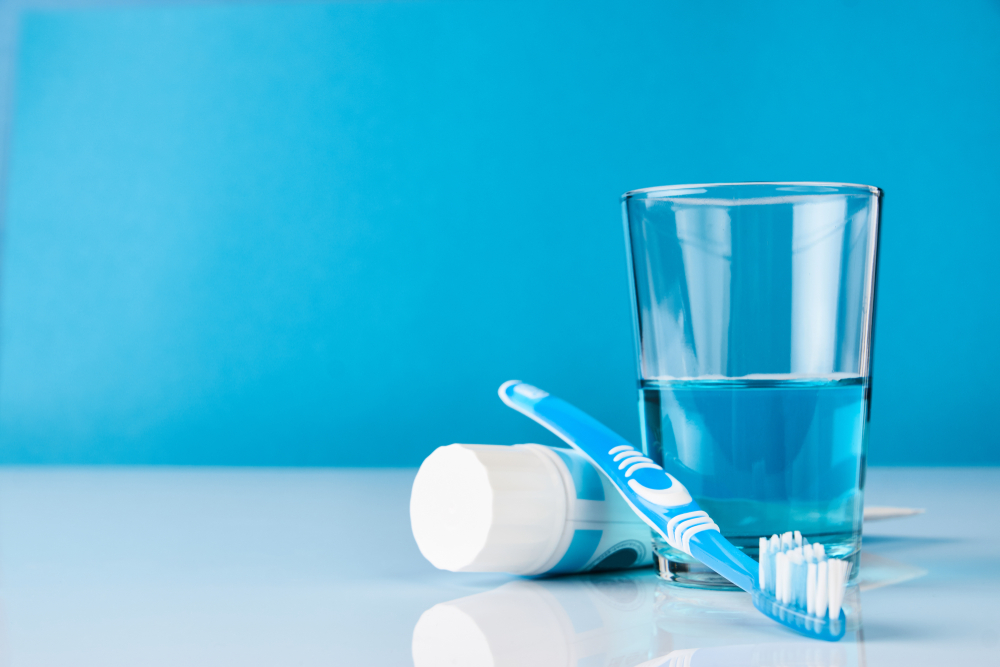
If you’re one of our Surrey and Langley braces and Invisalign® patients, you’re well aware of just how much emphasis we put on maintaining excellent oral hygiene here at Aura Orthodontics. Keeping your mouth healthy and clean helps teeth move more efficiently, prevents delays in your treatment and stops white spots, or decalcification, from forming on the teeth.
Yet, when you have an orthodontic appliance, getting rid of plaque and food particles is more challenging. Is brushing and flossing enough? Should you also incorporate a mouth rinse into your oral care routine? Let’s talk about it! In this post, we’ll be covering everything you need to know about mouthwash and braces and Invisalign.
Do You Need to Use Mouthwash With Braces and Aligners?
Using mouthwash with braces or aligners isn’t mandatory, but we would highly recommend it. Numerous studies have demonstrated its effectiveness. Research published in the Journal of International Society of Preventive & Community Dentistry, found that two types of antiseptic mouthwash (Cool Mint Listerine and a Chlorhexidine rinse) significantly reduced plaque and gingivitis. A review of studies on fluoride mouthwash determined that regular use of fluoride mouthwash was associated with a large reduction in cavities in the permanent teeth of kids and teenagers.
In order to reap these benefits, you should opt for a therapeutic mouthwash. Therapeutic mouthwashes contain active ingredients like fluoride, cetylpyridinium chloride, chlorhexidine and/or essential oils that have been shown to improve oral health. This will give you some extra protection while you’re wearing braces or Invisalign.
Additionally, just the act of swishing mouthwash around in your mouth will whisk away food debris and plaque that you missed or weren’t able to reach. This is especially important when you’re in orthodontic treatment since it’s hard to get in the nooks and crannies of your appliance or attachments. Using mouthwash is not a substitute for brushing and flossing, but it’s a helpful, effective addition to your oral hygiene routine.
What’s the Best Mouthwash for Braces and Invisalign Patients?
Some of the best mouthwash options for braces and Invisalign patients include:
- Listerine® Ultraclean Enamel Protection Zero Mouthwash – Listerine Ultraclean is an alcohol-free, fluoride mouthwash. This particular formula fights cavities and strengthens enamel with a less intense taste. The best part? Its oral health benefits have been validated by the Canadian Dental Association (CDA).
- Crest® Pro-Health Multi-Protection Mouthwash – Crest Pro-Health is another CDA-approved mouthwash for braces and Invisalign patients. It’s alcohol-free and contains active ingredients that may zap the germs that cause gingivitis, plaque and bad breath.
- TheraBreath® 24-Hour Healthy Smile Oral Rinse – TheraBreath makes dentist-formulated, alcohol-free rinses that freshen breath without burning or irritation. The brand’s Healthy Smile mouthwash contains both xylitol and fluoride to fight cavities and remineralize the teeth.
- Listerine® Cool Mint Antiseptic Mouthwash – Listerine Cool Mint has antimicrobial properties and helps to kill the bacteria responsible for gingivitis and plaque. Studies have shown that the mouthwash is effective in removing more plaque than brushing and flossing alone and it has the CDA seal of approval.
- Colgate® Peroxyl Antiseptic Mouth Rinse – If you have irritation from your braces or aligners or you’re prone to canker sores, Colgate Peroxyl is an excellent choice. Meant to be used temporarily, it cleanses mouth sores, reduces irritation and promotes healing. Once the irritation subsides, you can go back to your usual mouthwash.
For most patients, we’d say the best toothpaste and mouthwash for braces are those that contain fluoride. Even if you’re not usually prone to cavities, orthodontic treatment adds a layer of complexity to plaque removal. A fluoride mouthwash will help remineralize the teeth, which means replacing the minerals lost to plaque acids. This goes a long way in preventing tooth decay and white spots after braces.
If you have gingivitis or tend to get a lot of plaque build-up, an antimicrobial or antiseptic mouthwash might be the better choice. If you’re unsure, Dr. Sharma, Dr. Lin or Dr. Koo, certified specialists in orthodontics, can give you personalized recommendations based on your needs.
One other consideration to keep in mind is that when you start orthodontic treatment, your mouth can be sensitive. Since the main reason why mouthwash burns is the addition of alcohol, choosing an alcohol-free formula won’t make discomfort worse and will offer a more comfortable swishing experience.
How and When to Use Mouthwash

Patients often ask when to use mouthwash. We generally recommend using mouthwash after brushing and flossing your teeth so that it helps rinse away any lingering plaque and food. You can use it in the morning or evening, but using it before bed after you’ve finished all of your meals for the day will leave your mouth and appliance feeling extra clean.
Here’s how to use mouthwash to get the most benefit:
- After brushing and flossing your teeth, measure out the amount of mouthwash indicated on the product’s label or as prescribed by your dentist.
- Swish the mouthwash vigorously around in your mouth with your lips closed for 30 seconds to one minute (again, check the label). Anything less than 30 seconds won’t be all that helpful.
- Spit the mouthwash out into the sink when you’re finished swishing. Never swallow it.
- Wait about 30 minutes after rinsing your mouth before eating or drinking anything. This will ensure you give the active ingredients time to work their magic.
A note for parents: Children under six shouldn’t use mouthwash unless instructed to by their dentist. It’s recommended that parents supervise kids under 12 while they use a mouth rinse to ensure they’re using the correct amount and not swallowing it.
The Bottom Line
While using mouthwash isn’t a substitute for brushing and flossing, we would recommend adding it to your oral care routine during orthodontic treatment. Swishing with mouthwash will help to get rid of any food debris or plaque you may have missed and could lower your risk of tooth decay. In most cases, our orthodontists would recommend a fluoride or antiseptic mouthwash for braces and Invisalign patients.
Schedule a Consultation With a Surrey or Langley, BC Orthodontist
Are you ready to learn more about your teeth-straightening options? Schedule a consultation at Aura Orthodontics in Guildford, Scottsdale or Langley, BC. Our expert orthodontists will offer you personalized treatment recommendations and walk you through everything you need to know about caring for your smile with braces or Invisalign.





